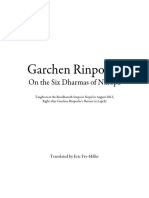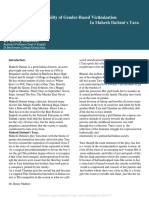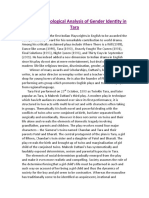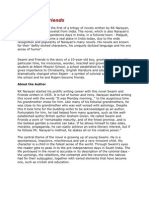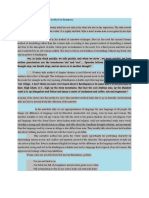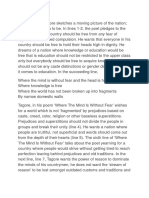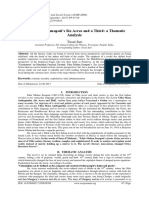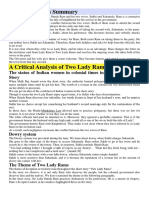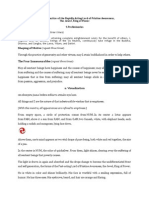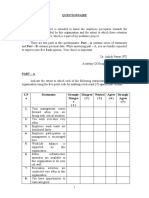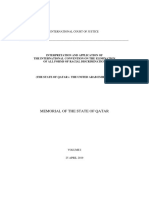TARA Mahesh Dattani
TARA Mahesh Dattani
Uploaded by
Karma ArnabCopyright:
Available Formats
TARA Mahesh Dattani
TARA Mahesh Dattani
Uploaded by
Karma ArnabOriginal Description:
Copyright
Available Formats
Share this document
Did you find this document useful?
Is this content inappropriate?
Copyright:
Available Formats
TARA Mahesh Dattani
TARA Mahesh Dattani
Uploaded by
Karma ArnabCopyright:
Available Formats
Mahesh Dattanis Tara: a Voice of Voiceless The Indian English Drama has given voice to the unvoiced section
of our society. It is a medium to reflect the mean, ugly and unhappy aspects of life. Drama is considered to be the most effective and po erful genre in the orld literature. The birth of Indian drama emphasi!es that it is an integral part of our society and culture. "rishna Mohan #aner$ee presented the first light of drama in India in %&%' in (The )ersecuted*. +o ever, the real $ourney of Indian drama started in %&,% ith the emergence of Michel Madhusudan Dutts (Is this -alled -ivili!ation*. Earlier the themes of drama ere concentrated on the religious convictions, philosophical approaches and the political changes of the country. .ater on there came the issues related to contemporary politics, social and economic problems, art, human life etc. The modern Indian drama concentrates on the several current issues and the real life problems. /ome of the modern drama riters include #adal /ircar, Mahesh Dattani and Man$ula )admanabhan etc. The topic of discussion here is Mahesh Dattanis (Tara*0%1123. 4bout Dattanis rting style, 5.".Dha an says, (Very recently Indian English Drama has shot into prominence. 6ounger riters li7e Mahesh Dattani and Man$ula )admanabhan, have infused ne life into this branch of riting*.0893 Mahesh Dattani is one of India:s best and most serious contemporary play rights, riting in English. +e is the first play right in English to be honoured ith the (/ahitya 47ademi 4 ard*. 4 director, actor, dancer, teacher and riter, Mahesh Dattani as born on 4ugust ,, %1;&. #efore entering the orld of theater, he or7ed as a copy riter in an advertising firm. In %1&<, he rote his first play : =here There:s a =ill:. /ince then he has never loo7ed bac7. There is a long chain of plays ritten by him as (Tara*, (>ight ?ueen*, (@inal /olutions*, (Dance li7e a Man* and many more. These are the plays, hich embody many of the classic concerns of the drama orld. +is plays deal ith the social and contemporary issues. 4part from theater, he is also active in the field of filmma7ing. Ane of his films (Dance li7e a Man* has on the a ard for the best picture in English a arded by the (>ational )anorama*. In the domain of Indian English Drama, Mahesh Dattanis plays have emerged as Bfresh arrivals. +is plays present real problems and sometimes cause controversy. Dattanis plays are (about the marginali!ed sections of our society: minorities, omen, gays, and hi$ras 0eunuch3.* They eCpose the violence of our private thoughts, and the hypocrisy of our public morals. +is or7 eCpresses his political beliefs ithout being instructive or revolting. +is plays Duestion all 7inds of discrimination, including religious pre$udice, gender discrimination and homoseCuality. The sub$ects of recognition and po er struggles, run right through all his plays. +is plays not only bring up gender issues and the space allotted to omen in a patriarchal society, but also they deal ith gender biases and pre$udices hich still affect the lives of many girlEchildren even amongst educated, urban families. +ere I have selected Dattanis play (Tara* for the study of gender discrimination in our society. (Tara* is not $ust the story of the protagonist of the play, but it is the story of every girl child born in Indian family hether urban or rural. (Tara* is an enthralling play that Duestions the role of a society that treats the children of the same omb in t o different ays. Tara is a girl ho ants to t in7le and shine, $ust li7e her name. It is a
play about t o children, $oined together at the hip. Aut of them, one is a boy and the other is a girl, they can be separated only surgically. This surgery means the death of either of the t o. The partiality and in$ustice starts here. It proves true that a oman herself is the orst enemy of other omen. The mother prefers the male child and thus strengthens the chain of in$ustice. The first thought behind selecting the male child is, he ill carry for ard the family name, and on the contrary, the ord girl is a synonym for (do ry*. The situation becomes orse, if the girl is physically challenged or there is any physical or mental deformity in her, then the do ry too ill not or7 out. /he ill remain unmarried and bring defame to family. It is a bitter eCample of child abuse prevalent in the Indian society. Every girl child born in an Indian family suffers from some 7ind of eCploitation and if there is a boy child in the family, the mistreatment is very much visible as consciously or unconsciously all the privileges are offered to the son. Dattani as a play right brea7s the unity of place, time and action in the very beginning of the play. 4fter the soliloDuy of Dan, hen he is sho n in .ondon at the lightening speed, then he appears in Mumbai from present to past. +ere, he is able to disregard the unities by the help of lighting along ith the music effects. Dattani very cleverly uses the lights to highlight the action herever he ants, at any level ithout any brea7s for change of scene. It is the use of lights and music, hich gives the play the feeling of unity of action. Music is so ell used that it creates and enhances the mood of characters. @ade music for past and flash bac7s and different music hen Tara is hurt or fight bet een #harti and her husband or hen the secret is revealed. Dattani very successfully uses all the resources of theatre. .i7e most of his plays, here also Dattani forces the present to confront the pastEa past that is dar7, hidden, and shameful. Dattani seems to suggest that unless e as individuals, families, and communities fran7ly tac7le our past, and s eep off the s7eletons in our cupboards, e ill not be able to eCorcise the ghosts of the past either in the present or in the future. (Tara* is a play in t o acts.It opens in .ondon. The scene is that, -handan, 0Dan3 no a play right is remembering his childhood days spent ith his sister Tara. +e is trying to rite a story about his o n childhood but he has to rite Taras story. 4s Tara and -handan are the t o sides of the same self, rather than t o separate entities. The play revolves around these t o /iemese t ins. The operation at the time of birth to separate them, leaves Tara crippled for life hereas -handan is privileged one. >o he ants to turn his anguish into drama by riting about his sisters childhood. Even after their unfair and manipulated division, hich is done against the la of nature, they are emotionally united. They share the same agony, hich Dan tries to delineate by riting autobiographical drama, though a futile attempt: Dan: Five me a moment and the pain ill subside. Then I can function again.Gpause, more controlled no H 6es. The material is there. #ut the craft is yet to come. .i7e the ama!ing Dr. Tha77ar, I must ta7e something from Tara and give it myself. Ma7e capital of my trauma, my anguish, and ma7e it my tragedy. I. /lo ly, as if in a trance, pic7s up the typed sheets and starts tearing them as he spea7s3. My progress so far, I must admit, has been !ero I. 0',13 Throughout the play, she bears some 7ind of grudge against the society. /he seems to
have some 7ind of hatred to ards the outside orld. +er orld is compressed, it consists of her parents and her brother hom she is very close to. #esides eCposing the typical Indian mindset and preference of a boy child to a girl child, the drama loo7s at the triumphs and failures of an Indian family, comprising of father 0)atel3, mother 0#harati3 and t o children 0 -handan and Tara3. Tara is a lively girl, ho does not get enough opportunities as his brother gets, eventually astes a ay, and dies. -handan escapes from the reality and settles in .ondonJ there he changes his name to BDan. Dattani has presented the bi!arre reality of omen playing a secondary role to man. In this play, the idea of female infanticide is presented. This filthy practice is still present in some places of India. The drama also suggests )atels hegemonic patriarchy, hen he insists that proper division should be made in the gender roles. Tara, symboli!es the modern society, hich claims to be liberal and advanced but Infact it has a cripple mentality. It is a society, here mothers are educated today, and omen are considered BDevis li7e BDurga, B"ali, B/aras atietc. /till there are differences bet een male and female child. 4ll the promises of eDuality bet een male and female, eDual opportunities to omen in all the fields are false. Mahesh Dattani reveals in one of his intervie s ith (.a7shmi /ubramanyam*, (I see Tara as a play about the male self and female self. The male self is being preferred in all cultures. The play is about the separation of self and the resultant angst*. G%'9H.. =hereas the famous theatre director (Erin Mee* rites in the note of the play that: Tara centres on the emotional separation that gro s bet een t o con$oined t ins follo ing the discovery that their physical separation as manipulated by their mother and grandfather to favour the boy G -handanH over the girl G TaraH . I=oven into the play are issues of class and community , and the clash bet een traditional and modern lifestyles and values. G'%1H. Taras parents are educated even then they had made such discrimination. #haratis father can also be considered responsible for this mishap. >evertheless, the Duestion arises here is, if #harati had been influenced by her fathers decision then hy didnt )atel come for ard and stand against thatK +e as the father of both the children and he should be strong enough to fight the discrimination. The relationship of #harati and Tara becomes ea7er on the discovery of truth. 4lthough she loves Tara a lot, but her sub$ugation to the eCpectations of society and her preference for her son, ma7es her compassion for Tara ea7. =hen -handan enDuires, hether she has any plans for Tara, she says, (6esL I have plans for her happiness. I mean to give her all love and affection, hich I can give. Its hat she deserves.*0 13. #harati is Duite fearful about the future of her daughterJ (Its all right hile she is young. It is all very cute and comfortable hen she ma7es itty remar7s. #ut let her gro up. 6es, -handan the orld ill tolerate you. The orld ill accept youE but not herL AhL II. hen she sees herself at eighteen or t enty, thirty is unthin7able and hat about forty and fiftyL Ah FodL 0'913. To shed her burden of guilt and to assert her moral superiority over her husband, she sho s eCtra maternal love and concern to ards her daughter. /he also tries to eCpand her love by the act of donating her 7idney to Tara, hich ultimately turns futile. Dattani establishes that mother and daughter relationship proves secondary to the orders of patriarchy. Mr.)atel, Taras father is an emblem of male chauvinism. +e holds the absolute position in decision ma7ing about the
family. #harati has to follo his ish. /he is a pathetic victim of patriarchy. /he eCceptionally cares for Tara, to overcome her o n guilt. Tara represents the subaltern and the sub$ugated. /he does not have any choice, she has to accept hatever is given to her. The suffering of Tara and -handan is a symbolic validation to the perception that the elegance of the relationship eCists not in their separateness but in their moving in a coordination or interdependence. Erin Mee says , (Dattani sees Tara as a play about the gendered self, about coming to terms ith the feminine side of oneself in a orld that al ays favours hat is Bmale, but many people in India see it as a play about the girl child.* 0'823 )Eatels attitude is al ays negative. +e blames his ife and fatherE inE la for the damage done earlier, but his position cannot be denied. +e gives greater chances to -handan, plans for his education and future career, but nothing for Tara. /he is a victim of collective social system. +er father is not much different from her mother. /he had favoured -handan at the time of operation and then on ards their father has been preferring -handan. =hen it is about education or other facilities, he only thin7s of his son. )atel ma7es #harati responsible for everything and gets an escape from his responsibilities. +e says, (I.oo7 at the ay you treat Tara .4s if she is made of glass. 6ou coddle her, you pet her, you spoil her, /hes gro n up, .. feeling she doesnMt need anyone but you.L #+454TI: 4ll right .6ou stay at home thenL 6ou stay at home and atch hat they can do and hat they canMt .6ou remind them of hat they canMt be. Its easy for you to tal7 about their future and your plans. #ut tell them hat they should do no .This day, this hour, this minute.Tell themL I ant to hear. )atel: -handan is going to study further and he ill go abroad for his higher studies. #harati: 4nd TaraK )atel: =hen have you ever allo ed me to ma7e any plans for herK 0';83. Dr. Tha77ar stands on the highest level throughout the play. +e operates the t o /imese t ins, but he has done an unfair and uneDual operation under the pressure of #haratis father. +e as a ealthy man and very soon supposed to become -hief Minister. Dr. Tha77ar collaborates ith them and gives the male child better chances physicallyEthe second leg to -handan. Dr. Tha77ar, the godEli7e, Blife giver is a are that the third leg ould adhere better to the female half, and yet becomes party to the decision. Dan tries to define his other half, the spirited Tara, (/he never got a fair deal. >ot even from nature. >either of us did. May be Fod never anted us separated. Destiny desires strange thingsEEEEE#ut even Fod does not al ays get hat he ants. -onflict is the cruC of life.* 0''23. The Duestion remains, hy as then Tara denied the privilege of the good leg. =hyK Is it only because she as a girlK Dattani aptly sho s that in this society it is a curse to be a girl. In this country so much partiality and differentiation is there for omen. +o ever, a rich heritage e have and omen are other ise placed on the high pedestals. Dr. Tha77ar disproved his godly profession and let himself bribed by #haratiMs father and became a coEconspirator in the bi!arre act of severing the leg. +e should have endorsed his profession by disapproving the decision at his inception, hereas he in a ay too7 TaraMs life by severing the leg. +is ise decision could have given Tara a safe, secured and complete life. #ut TaraMs maternal grandfather had also cheated her. +e as in politics and came very close to becoming the -hief Minister. Dattani cleverly tears off
the mas7 from the faces of Indian politicians. An the one side they promise for omen security, education for girls and prevention of female feticide, and in their o n family they are partial enough. =hen it comes to a male grandson, #haratis father at once chooses life for -handan. Even he leaves all his property to -handan and not a single penny for Tara. Mr. )atel and -handan are tal7ing, )atel: +e G grandfatherH left you a lot of money. -handan: 4nd TaraK )atel: >othing -handan: =hyK )atel: It as his money. +e could do hat he anted ith it. 0'<23 =hen Tara comes to 7no that it as her mother ho made such a decision, hich she trusted most, she cannot bear this truth and the shoc7 ta7es a ay her life. /he is not dead, but she is 7illed by the society. >evertheless, Tara could have made her boldness, her strength and fight the society to engrave a place of her o n. Even though she is more intelligent, sharp and itty and ould have performed much better than the male child ould, if only she had been given a chance. /he is not deterred by the in$ustice done to her, but she thin7s that, (I ill spend the rest of my life feeding and clothing those. EEEEstarving na7ed millions every here. May be I can start an institution that ill EEEE do all that. Ar I could $oin Mother Teresa and sacrifice myself to a great cause. That may giveEEE purpose to my EEEeCistence.* 0',23. /he is discouraged from the very first day of her life. /he as bubbly and energetic girl ho had all the Dualities of a normal girl. If her parents had given her moral support, she might have shone li7e a star as her name signifies. +er life as considered to be a burden on this earth. This made her lose interest in life altogether. @urther, she refuses to go to physiotherapy or fill forms for college. It is note orthy that discrimination ith Tara continues, even after her death. -handan, ho as al ays interested in riting a story, ma7es the story, he rites, his o n tragedy. Dan apologises to Tara for doing this, (@orgive me, Tara .@orgive me for ma7ing it my tragedy.* 0'&23. Mahesh Dattani has very deftly revealed the theme of gender discrimination in this play. The social norms, economic standards and cultural factors have been responsible for the in$ustice against the girl child. 4ll these factors combine to create the social system in hich the girl child has to live and die. Tara is 7illed by this social system, hich controls the minds and actions of the people. The trauma of coming to 7no the role her mother had played in her life, and the discrimination becomes too much for her. TaraMs potentiality as sacrificed at the altar of gender. Identity crisis becomes a chain ith hich a female is bound hen the Duestion of choice bet een male and female comes up. If e thin7, hy is she 7illedK The ans er is crystal clear that Tara is not anted, because she is a girl. In our society, (Firls* are not anted. @or a moment, if e imagine that Taras mother had preferred her at the time of operation instead of -handan. =ould she have forgivenK >o, >everL #ecause she also is a =oman. +ere omen are not made to thin7 or decide but are made to submit to the ishes of man. This man can be a father, husband, brother or son, ho ever he isJ at the end, they have an identity. #ut a mother, a ife, a sister and a daughter at last turn out to be only ( omen, submitting to their ills
and losing their o n identity.*
You might also like
- The Students' Perception On The Humss Strand Under The K-12 Basic Education ProgramDocument31 pagesThe Students' Perception On The Humss Strand Under The K-12 Basic Education ProgramJeq78% (76)
- 6th Central Pay Commission Salary CalculatorDocument15 pages6th Central Pay Commission Salary Calculatorrakhonde100% (436)
- Sri Nrisimharpiya English Full Book June 2021Document90 pagesSri Nrisimharpiya English Full Book June 2021sadagopaniyengar100% (1)
- TaraDocument5 pagesTaraTapaswee Dixit0% (1)
- Tara - English ProjectDocument19 pagesTara - English ProjectRenu Gothwal100% (3)
- Feminism in Kamla Das' PoetryDocument75 pagesFeminism in Kamla Das' PoetryShivangiNo ratings yet
- Yogi Chen TeachingsDocument920 pagesYogi Chen TeachingsKarma Arnab100% (2)
- Padmakara and Mandarava Amitayus Long LifeDocument11 pagesPadmakara and Mandarava Amitayus Long LifeKarma Arnab100% (3)
- Garchen Rinpoche On The Six Dharmas of NaropaDocument15 pagesGarchen Rinpoche On The Six Dharmas of NaropaKarma Arnab100% (9)
- Mor 479Document13 pagesMor 479socalsurfyNo ratings yet
- Inequality of Gender-Based Victimization in Mahesh Dattani's TaraDocument3 pagesInequality of Gender-Based Victimization in Mahesh Dattani's TaraBinny MathewNo ratings yet
- Gender Discrimination in Mahesh Dattani's Play "Dance Like A Man" and "Tara" - A Critical AnalysisDocument4 pagesGender Discrimination in Mahesh Dattani's Play "Dance Like A Man" and "Tara" - A Critical AnalysisIJELS Research JournalNo ratings yet
- TaraDocument4 pagesTaraSrishti RayNo ratings yet
- Gender Discrimination in Mahesh Dattani's Play TaraDocument3 pagesGender Discrimination in Mahesh Dattani's Play TaraFaruk R AhamedNo ratings yet
- Dattani and His Dramatic Output - Social Reality On StageDocument3 pagesDattani and His Dramatic Output - Social Reality On StageIJELS Research JournalNo ratings yet
- The Unheard Voice in Mahesh Dattani's TaraDocument6 pagesThe Unheard Voice in Mahesh Dattani's TaraUGCJOURNAL PUBLICATIONNo ratings yet
- Gender Discrimination in Mahesh Dattanis Dance Like A Man and Tara-2018-11!24!12-19Document4 pagesGender Discrimination in Mahesh Dattanis Dance Like A Man and Tara-2018-11!24!12-19Impact Journals100% (1)
- Themes in Dattani's PlaysDocument5 pagesThemes in Dattani's PlaysArijit DasNo ratings yet
- Tara FeminismDocument3 pagesTara FeminismDushyant Nimavat100% (1)
- Gender Discrimination in TaraDocument4 pagesGender Discrimination in TaraTannuNo ratings yet
- Gender Theme in Tara PlayDocument6 pagesGender Theme in Tara PlayRamNo ratings yet
- Silence! The Court in SessionDocument17 pagesSilence! The Court in SessionSaumya badigineniNo ratings yet
- The Issue of Identity in Manjula Padmanabhan's Harvest and Mahesh Dattani's Dance Like A Man.Document7 pagesThe Issue of Identity in Manjula Padmanabhan's Harvest and Mahesh Dattani's Dance Like A Man.suraj soniNo ratings yet
- Discrimination of Class and Gender: Mahesh Dattani's TaraDocument8 pagesDiscrimination of Class and Gender: Mahesh Dattani's TaraAditya MisraNo ratings yet
- Critical Analysis Swami and Friends by HDocument2 pagesCritical Analysis Swami and Friends by HParthiva SinhaNo ratings yet
- A Study of Kamala Das's PoetryDocument3 pagesA Study of Kamala Das's PoetryMiah RashiduzzamanNo ratings yet
- Language in 'In Custody'Document2 pagesLanguage in 'In Custody'Drishti AroraNo ratings yet
- Swami and Friends AssignmentDocument10 pagesSwami and Friends AssignmentDeepali puri0% (1)
- Swami and FriendsDocument5 pagesSwami and FriendsSaad Abdullah0% (2)
- Question: Comment On The Use of Irony and Humour in R.K. Narayan's Swami and Friends. Answer: Childhood Means Simplicity. It Is Carefree. Playing inDocument3 pagesQuestion: Comment On The Use of Irony and Humour in R.K. Narayan's Swami and Friends. Answer: Childhood Means Simplicity. It Is Carefree. Playing inPRADEEPKUMAR S100% (1)
- The Position of Women in The Short Stories, The Last Song and The Pot Maker, by TemsulaAo.Document3 pagesThe Position of Women in The Short Stories, The Last Song and The Pot Maker, by TemsulaAo.IJELS Research JournalNo ratings yet
- Final SolutionsDocument9 pagesFinal SolutionsYashwant Handibag67% (3)
- CBCS Paper 4Document31 pagesCBCS Paper 4POLASH BHUYAN JNV TITABOR50% (2)
- Chandalika: by Rabindranath TagoreDocument11 pagesChandalika: by Rabindranath TagoreYash AgrawalNo ratings yet
- Premchand GodaanDocument6 pagesPremchand Godaanerutnarain75% (4)
- In Custody PDFDocument4 pagesIn Custody PDFSandeep K. Jaiswal0% (1)
- Character of Anandamoyi As Mother India PersonifiedDocument2 pagesCharacter of Anandamoyi As Mother India PersonifiedSAYANTAN GHOSHNo ratings yet
- Character of Murad in in CustodyDocument1 pageCharacter of Murad in in CustodyBinoy DangarNo ratings yet
- Horace As A CriticDocument9 pagesHorace As A CriticDoc Gievanni Simpkini100% (1)
- Classnotes On Neruda and Spain PDFDocument3 pagesClassnotes On Neruda and Spain PDFmalvika100% (1)
- Violence in The Name of Religion in 'Ice Candy-Man'Document2 pagesViolence in The Name of Religion in 'Ice Candy-Man'Muhammad Saad Ashraf100% (1)
- Kenchamma in KanthapuraDocument4 pagesKenchamma in KanthapuraAisha RahatNo ratings yet
- Narrative Technique of KantapuraDocument2 pagesNarrative Technique of KantapuraRatan Roy100% (1)
- Meg 14Document7 pagesMeg 14Sameer DarNo ratings yet
- Halfway HouseDocument4 pagesHalfway Houseपुष्प समब्याल100% (1)
- KurudavvaDocument7 pagesKurudavvaSneha PradhanNo ratings yet
- Raj MohanDocument9 pagesRaj MohanTaniya Banerjee50% (2)
- T He Madness in Manto's "Toba Tek Singh"Document4 pagesT He Madness in Manto's "Toba Tek Singh"Rohit SahaNo ratings yet
- Mother of 1084 NotesDocument7 pagesMother of 1084 NotesNaveenNo ratings yet
- The Intrusion - SeminarDocument2 pagesThe Intrusion - SeminarSachin Rajeev100% (1)
- Format. Hum - Being HIJRA A Stigma A Perusal To A Revathi The Truth About Me - A HIjra Life StoryDocument6 pagesFormat. Hum - Being HIJRA A Stigma A Perusal To A Revathi The Truth About Me - A HIjra Life StoryImpact JournalsNo ratings yet
- Sight & BlindnessDocument7 pagesSight & BlindnessMd Mujib Ullah100% (1)
- Summary and Analysis of The Enterprise by Nissim EzekielDocument2 pagesSummary and Analysis of The Enterprise by Nissim EzekielJayanti Neogi SardarNo ratings yet
- Structure and Theme in Anita DesaiDocument10 pagesStructure and Theme in Anita DesaiGhanshyam PatelNo ratings yet
- Use of Myth in Kanthapura: Parallelism Between Ramayana and KanthapuraDocument4 pagesUse of Myth in Kanthapura: Parallelism Between Ramayana and KanthapuraEditor IJTSRDNo ratings yet
- The Shadow Lines Additional NotesDocument39 pagesThe Shadow Lines Additional NotesShahruk Khan100% (1)
- Summary For Where Mind Is Without FearDocument4 pagesSummary For Where Mind Is Without FearRachna Maheshwari100% (1)
- Raja Rao's Kanthapura: A Journey To DecolonizationDocument6 pagesRaja Rao's Kanthapura: A Journey To DecolonizationIJELS Research JournalNo ratings yet
- Mahesh Dattani and Indian Poetics: A Study of His Selected Plays in The Light ofDocument21 pagesMahesh Dattani and Indian Poetics: A Study of His Selected Plays in The Light ofSharma AksheyNo ratings yet
- Aristptle's Concept of CathersisDocument7 pagesAristptle's Concept of CathersisRamesh Mondal100% (1)
- EEG 06 Solved Assignment Ignou 2020-21Document6 pagesEEG 06 Solved Assignment Ignou 2020-21IGNOU ASSIGNMENTNo ratings yet
- Nissim Ezekiel's Night of The Scorpion - Summary & Analysis - ILU EnglishDocument2 pagesNissim Ezekiel's Night of The Scorpion - Summary & Analysis - ILU EnglishSrinivas Reddy AnnemNo ratings yet
- Fakir Mohan Senapati S Six Acres and A Third: A Thematic AnalysisDocument3 pagesFakir Mohan Senapati S Six Acres and A Third: A Thematic AnalysisAutam SinghNo ratings yet
- Loving in TruthDocument3 pagesLoving in TruthSoma Biswas100% (2)
- Nationalism in IndiaDocument4 pagesNationalism in Indiashireen majumdarNo ratings yet
- Two Lady Rams SummaryDocument5 pagesTwo Lady Rams SummaryBrahmankhanda Basapara HIGH SCHOOLNo ratings yet
- Ruqya-For Evil Eye SorceryDocument61 pagesRuqya-For Evil Eye SorceryKarma Arnab100% (1)
- English Self Ruqya TreatmentDocument292 pagesEnglish Self Ruqya TreatmentKarma ArnabNo ratings yet
- Soundarya LahiriDocument42 pagesSoundarya Lahiriviswanath venkiteswaranNo ratings yet
- 100 Methi, Dhoope Me Suka Ke Powder 100 Tej Patta 150 GM Jamun Beej 250gm Bel Patta Powder MixDocument1 page100 Methi, Dhoope Me Suka Ke Powder 100 Tej Patta 150 GM Jamun Beej 250gm Bel Patta Powder MixKarma ArnabNo ratings yet
- Paida Lajin Self-Healing EnglishDocument69 pagesPaida Lajin Self-Healing EnglishKarma Arnab100% (2)
- Unconscious MindDocument9 pagesUnconscious MindKarma ArnabNo ratings yet
- Chakra Meditation2 PDFDocument7 pagesChakra Meditation2 PDFKarma Arnab100% (1)
- The Essentials of Mahamudra PracticeDocument26 pagesThe Essentials of Mahamudra PracticeKarma Arnab100% (3)
- 0001 PDFDocument129 pages0001 PDFChriv IelleNo ratings yet
- Brief Daily Practice of The Rapidly Acting Lord White MahakalaDocument7 pagesBrief Daily Practice of The Rapidly Acting Lord White MahakalaKarma ArnabNo ratings yet
- Mandala OfferingDocument3 pagesMandala OfferingKarma Arnab100% (1)
- Taking 8 Maha YanaDocument12 pagesTaking 8 Maha YanaKarma ArnabNo ratings yet
- Tsa-Tsas The Practice For PlasterDocument4 pagesTsa-Tsas The Practice For PlasterKarma Arnab100% (1)
- The Practice of The Single Yellow DzambalaDocument5 pagesThe Practice of The Single Yellow DzambalaKarma ArnabNo ratings yet
- Dudjom Tersar NgondroDocument40 pagesDudjom Tersar NgondroKarma Arnab100% (1)
- Zachary LeRoy StevensDocument60 pagesZachary LeRoy StevensWest HubNo ratings yet
- PB AmE B1 SB Audioscript U2Document2 pagesPB AmE B1 SB Audioscript U2Romina Caballero PazNo ratings yet
- Event Driven Architecture GuideDocument17 pagesEvent Driven Architecture GuideAbdi M KaahinNo ratings yet
- Romans Part 2Document19 pagesRomans Part 2api-264767612No ratings yet
- Test Bank For Understanding Health Insurance A Guide To Billing and Reimbursement 2020 15th Edition Michelle Green Full DownloadDocument18 pagesTest Bank For Understanding Health Insurance A Guide To Billing and Reimbursement 2020 15th Edition Michelle Green Full Downloadkylerobinsonadircqxfyk100% (18)
- EKK NewsletterDocument8 pagesEKK Newsletterapi-3735950No ratings yet
- Directory 29.09.2020Document18 pagesDirectory 29.09.2020Vadivel BalasubramaniamNo ratings yet
- Introduction of Printing Presses and Publications Act 1984Document4 pagesIntroduction of Printing Presses and Publications Act 1984Wan Shakiki MazlanNo ratings yet
- Effects of Skipping Breakfast On LongDocument6 pagesEffects of Skipping Breakfast On LongisyraffitriNo ratings yet
- Egyptian Civilization: Management AntiquityDocument6 pagesEgyptian Civilization: Management AntiquityMostaque Ahmed AnntoNo ratings yet
- QuestionnaireDocument3 pagesQuestionnaireAshish PawarNo ratings yet
- Evaluacion Diagnostica Tercer AñoDocument3 pagesEvaluacion Diagnostica Tercer AñoEfrén Ruilova MerchánNo ratings yet
- Active and PassiveDocument4 pagesActive and PassiveQUEROBIN QUEJADONo ratings yet
- Visualizing Criminal Networks White PapersDocument7 pagesVisualizing Criminal Networks White PapersTrip KrantNo ratings yet
- Civil Law Reviewer - Persons and Family RelationsDocument22 pagesCivil Law Reviewer - Persons and Family RelationsKin Pearly FloresNo ratings yet
- DHG AnalysisDocument20 pagesDHG Analysishoang minh phuongNo ratings yet
- History of The BarDocument6 pagesHistory of The BarPrecious Renzlyn Cadion100% (1)
- Reflection PaperDocument1 pageReflection PaperAlyana Nicole PagdilaoNo ratings yet
- Seoul Eat Feasibility StudyDocument113 pagesSeoul Eat Feasibility StudyKATE NICOLE BELLEZANo ratings yet
- Comm 310 Case AnalysisDocument3 pagesComm 310 Case Analysisapi-666698628No ratings yet
- Tayag vs. Tayag-Gallor Case DigestDocument3 pagesTayag vs. Tayag-Gallor Case DigestArmstrong Bosantog100% (2)
- Qatar v. UAE (Racial Discrimination)Document417 pagesQatar v. UAE (Racial Discrimination)PRINCE LLOYD D.. DEPALUBOSNo ratings yet
- Nit Wise Final Select List of Sub Inspec R F Pol CE CIVIL) - 2019 With Respect To Central Ange Enga URUDocument3 pagesNit Wise Final Select List of Sub Inspec R F Pol CE CIVIL) - 2019 With Respect To Central Ange Enga URUManish ChavannavarNo ratings yet
- Yfc Discovery Camp Manual (2009 Edition)Document59 pagesYfc Discovery Camp Manual (2009 Edition)Flynn Errol Garcia100% (2)
- Adverbs and Adjectives (2023)Document5 pagesAdverbs and Adjectives (2023)nguyendongnghi49No ratings yet
- Assassin Teens-Ryan, AvengerDocument10 pagesAssassin Teens-Ryan, AvengerSunay BhagatNo ratings yet
- App Trump JurRspDocument12 pagesApp Trump JurRspWashington ExaminerNo ratings yet








